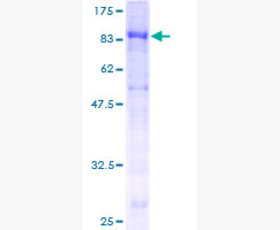Recombinant Human Carboxypeptidase M/CPM
| Product name: | Recombinant Human Carboxypeptidase M/CPM |
| Source: | Human Cells |
| Purity: | Greater than 95% as determined by reducing SDS-PAGE. |
| Buffer Formulation: | Supplied as a 0.2 μm filtered solution of 20mM TrisHCl,150mM NaCl,1mM ZnCl2,pH7.5. |
| Applications: | Applications:SDS-PAGE; WB; ELISA; IP. |
| Storage: | Avoid repeated freeze/thaw cycles. Store at 2-8 oC for one month. Aliquot and store at -80 oC for 12 months. |
| UOM: | 100ug/50ug/200ug/1mg/1g |
| Source | Human Cells |
| Description | Recombinant Human Carboxypeptidase M is produced by our Mammalian expression system and the target gene encoding Leu18-His422 is expressed with a 6His tag at the C-terminus. |
| Names | Carboxypeptidase M,CPM |
| Accession # | P14384 |
| Formulation | Supplied as a 0.2 μm filtered solution of 20mM TrisHCl,150mM NaCl,1mM ZnCl2,pH7.5. |
| Shipping |
The product is shipped on dry ice/ice packs. |
| Storage |
Store at < -20°C, stable for 6 months after receipt. Please minimize freeze-thaw cycles. |
| Purity |
Greater than 95% as determined by reducing SDS-PAGE. |
| Endotoxin | Less than 0.1 ng/µg (1 IEU/µg) as determined by LAL test. |
| Amino Acid Sequence |
LDFNYHRQEGMEAFLKTVAQNYSSVTHLHSIGKSVKGRNLWVLVVGRFPKEHRIGIPEFKYVANM HGDETVGRELLLHLIDYLVTSDGKDPEITNLINSTRIHIMPSMNPDGFEAVKKPDCYYSIGRENY NQYDLNRNFPDAFEYNNVSRQPETVAVMKWLKTETFVLSANLHGGALVASYPFDNGVQATGALYS RSLTPDDDVFQYLAHTYASRNPNMKKGDECKNKMNFPNGVTNGYSWYPLQGGMQDYNYIWAQCFE ITLELSCCKYPREEKLPSFWNNNKASLIEYIKQVHLGVKGQVFDQNGNPLPNVIVEVQDRKHICP YRTNKYGEYYLLLLPGSYIINVTVPGHDPHITKVIIPEKSQNFSALKKDILLPFQGQLDSIPVSN PSCPMIPLYRNLPDHVDHHHHHH
|
| Background | These enzymes remove C-terminal amino acids from peptides and proteins and exert roles in the physiological processes of blood coagulation/fibrinolysis, inflammation, food digestion and pro-hormone and neuropeptide processing. CPM is widely distributed in a variety of tissues and cells. CPM is involved in peptide metabolism on both the cell surface and in extracellular fluids. CPM functions not only as a protease but also as a binding partner in cell-surface protein-protein interactions. |














